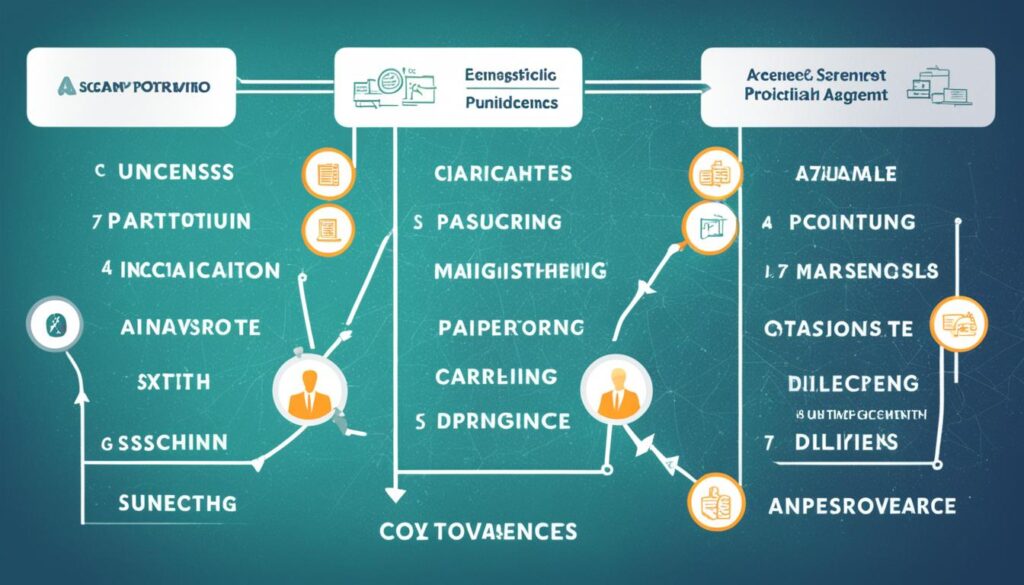Venture capital (VC) firms are the driving force behind many of the world’s most innovative startups, and at the heart of these VC organizations are the principals – the individuals responsible for identifying, evaluating, and managing investments in promising companies. But what exactly does a VC principal do, and how does their role differ from that of their partners? Let’s delve into the intriguing world of venture capital principals and uncover the secrets of their day-to-day responsibilities.
Key Takeaways
- VC principals are responsible for sourcing, evaluating, and managing investments in promising startups
- Principals conduct due diligence and negotiate deal terms on behalf of the VC firm
- Principals have a more “hands-on” role compared to partners, who focus on higher-level strategic decisions
- Becoming a VC principal requires extensive experience, knowledge, and a proven track record of sound investment judgment
- The VC principal role is often seen as a stepping stone towards the partner level, but the path to partnership is not guaranteed
Understanding the Role of a Venture Capital Principal
Venture capital (VC) principals play a vital role within VC firms, serving as the key drivers behind the firm’s investment activities. In contrast to VC partners, who focus on higher-level strategic decisions and fundraising, VC principals take a more “hands-on” approach, actively involved in supporting the firm’s portfolio companies.
Responsibilities and Duties
VC principals are responsible for sourcing new investment opportunities, conducting thorough due diligence on potential investments, and managing the firm’s portfolio companies. They work closely with entrepreneurs, providing guidance, expertise, and resources to help grow their businesses. VC principals are the ones who truly get their hands dirty, ensuring the firm’s investments are strategically positioned for success.
Difference Between Principal and Partner
While VC partners hold the ultimate authority to approve or reject deals, VC principals play a crucial role in the decision-making process. Principals are generally on the “partner track,” expected to prove themselves as skilled investment decision-makers before potentially ascending to the partner level. Partners, on the other hand, focus more on high-level strategy, fundraising, and building the firm’s brand, leaving the day-to-day investment activities to their principal counterparts.
| Characteristic | VC Principal | VC Partner |
|---|---|---|
| Investment Sourcing | Actively Involved | Less Involved |
| Due Diligence | Extensive Involvement | Oversight Role |
| Portfolio Management | Hands-On Approach | Strategic Guidance |
| Deal Approval | Recommends Deals | Final Decision Authority |
| Career Path | On “Partner Track” | Established Partners |

Qualifications and Experience Needed
Becoming a VC principal requires a significant amount of experience, knowledge, and previous success in lower positions within the VC industry, such as associate or analyst roles. Principals are generally promoted from within the same firm or from another VC firm, and they must have a proven track record of sound judgment and expertise in venture capital investments. They are typically considered “on the partner track” and are expected to spend 5-10 years in the principal role before potentially advancing to the partner level.
The qualifications to become a VC principal are not easily attainable, as this role requires a significant amount of experience needed to be VC principal. Aspiring VC principals must demonstrate their ability to execute deals, source good investment opportunities, and effectively support the firm’s portfolio companies. Proving these VC principal requirements is the key to being considered for promotion to the principal role, which is often seen as a stepping stone to the partner level.

What does a principal at a VC do?
Venture capital (VC) principals play a crucial role in the day-to-day operations and investment activities within a VC firm. Their responsibilities span across three key areas: sourcing investment opportunities, conducting due diligence, and managing portfolio companies.
Sourcing Investment Opportunities
VC principals are tasked with identifying and evaluating potential investment opportunities. They actively network with entrepreneurs, attend industry events, and leverage their extensive industry connections to source promising startups that align with the VC firm’s investment thesis and portfolio strategy. Principals play a vital role in building and maintaining a robust pipeline of deals for the firm to consider.
Conducting Due Diligence
Once a promising investment opportunity is identified, VC principals take the lead in conducting thorough due diligence on the startup. They analyze the company’s financial statements, assess the management team’s capabilities, evaluate the market potential, and identify potential risks and growth opportunities. Principals prepare detailed investment memos and recommendations for the VC partners, who make the final decision on whether to proceed with the investment.
Managing Portfolio Companies
After an investment is made, VC principals take an active role in supporting and managing the portfolio company. They work closely with the startup’s founders, providing strategic guidance, operational support, and access to the VC firm’s network of resources and expertise. Principals also monitor the company’s performance, assist with important decisions, and help the startup navigate growth and scaling challenges.
By taking on these hands-on responsibilities, VC principals serve as a crucial bridge between the VC partners and the firm’s portfolio companies, ensuring that investments are managed effectively and optimized for the best possible returns.

Venture Capital Principal Lifestyle and Work Hours
The daily responsibilities of a VC principal can be both demanding and rewarding. According to industry data, the average workweek for a VC principal typically ranges from 50 to 60 hours, similar to that of a VC associate. These professionals spend a significant portion of their time in meetings, traveling to industry events, and attending to the needs of their portfolio companies.
Expectations and Work-Life Balance
While VC principals may spend less time on spreadsheet-heavy tasks compared to more junior roles, they often face greater personnel and management challenges. The fast-paced nature of the job can be stressful at times, but the work is generally considered rewarding. VC principals must juggle their responsibilities while maintaining a healthy work-life balance, which can be a delicate balancing act.
The VC principal lifestyle often involves long hours spent reviewing deals, managing portfolio companies, and responding to the demands of various stakeholders. However, the potential for career advancement and the opportunity to play a critical role in the growth of innovative startups make the role attractive to many professionals seeking a dynamic and impactful career path.
Overall, the VC principal work hours and the associated work-life balance challenges are important considerations for individuals aspiring to this position within the venture capital industry.
Salary, Bonus, and Carried Interest Compensation
The compensation structure for a venture capital (VC) principal can be quite lucrative, with the total compensation package ranging from $250,000 to $400,000 at an “average” VC firm. This breakdown typically consists of a base VC principal salary that accounts for 60-80% of the total, complemented by a VC principal bonus that makes up the remaining 20-40%.
At smaller VC firms with less than $300 million in assets under management, the VC principal compensation range may be slightly lower, typically falling between $200,000 to $250,000. However, the core components of base salary and bonus remain consistent across the industry.
Carried Interest and Profit-Sharing
In addition to their base salary and bonus, VC principals can also earn a share of the firm’s carried interest, which is the portion of the fund’s profits that is distributed to the investment team. While the carried interest allocated to principals is typically less than 5% of the total carried interest, it can still translate to an extra $100,000 per year in total compensation for a principal in a successful fund.
It’s important to note that the potential for carried interest earnings is not a guarantee and is largely dependent on the fund’s long-term performance. Unless the principal remains in the role for an extended period and the fund delivers exceptional results, the carried interest component is unlikely to be a game-changer in the overall VC principal compensation package.

| Compensation Element | Average VC Firm | Smaller VC Firms |
|---|---|---|
| VC Principal Salary | 60-80% of total compensation | 60-80% of total compensation |
| VC Principal Bonus | 20-40% of total compensation | 20-40% of total compensation |
| VC Principal Carried Interest | Less than 5% of total carried interest | Less than 5% of total carried interest |
| Total Compensation Range | $250,000 – $400,000 | $200,000 – $250,000 |
Career Path and Advancement Opportunities
Becoming a venture capital (VC) principal is not a straightforward path, as this role is typically in the middle of the VC firm’s hierarchy. More often than not, individuals join the industry as post-MBA or pre-MBA associates and work their way up to the principal level. This requires demonstrating a proven track record of executing deals, sourcing promising investment opportunities, and effectively supporting the firm’s portfolio companies.
Transitioning from Associate to Principal
To transition from an associate to a VC principal, individuals must showcase their ability to make sound investment decisions, source high-quality deal flow, and provide valuable support to the startups in the firm’s portfolio. This involves honing their analytical and financial modeling skills, as well as developing strong communication and networking abilities. Principals are often seen as the “next generation” of partners, and their performance in the associate role is closely scrutinized as they climb the career ladder.
Path to Partnership
While the principal role is typically a stepping stone to the partner level, the path to partnership is not guaranteed. Principals must continue to prove their worth by consistently identifying and executing successful investments, building strong relationships with entrepreneurs, and contributing to the overall growth and success of the VC firm. However, some principals may choose to pursue alternative career options outside of venture capital if they decide against pursuing the partner track, as the VC principal role can have its own set of challenges and drawbacks.

Challenges and Drawbacks of the Role
While the venture capital principal position offers a rewarding career opportunity, it also comes with its fair share of challenges and drawbacks. The fast-paced nature of the work, coupled with the significant time spent in meetings, traveling, and managing personnel issues, can often lead to a stressful work environment for VC principals.
Additionally, despite the substantial compensation, the remuneration for VC principals is generally lower than that of investment banking associates or private equity associates. Furthermore, the potential for earning carried interest, a lucrative source of income for VC partners, is often more limited for principals. This can be a point of frustration for those seeking to maximize their earnings potential.
Another challenge faced by VC principals is the uncertainty of the path to partnership. While the principal role is often seen as a stepping stone to the partner level, the transition is not guaranteed. This can create a sense of job insecurity and lead some principals to consider alternative career options outside of the venture capital industry. However, these exit opportunities may be more limited, as the principal’s skills and experience may not always translate directly to other investment or operational roles.

Exit Opportunities and Alternative Careers
According to the factual data, the main VC principal exit opportunities typically involve transitioning into an operational role at a startup or tech company. However, it can be more challenging for principals to directly move into investment banking, private equity, or other investing roles, unless they have prior experience in those fields. Growth equity is a potential alternative career path, but the options depend on the specific firm, investment strategy, and the principal’s relevant experience.
The VC principal role is often considered a stepping stone towards the partner level within the venture capital industry. If the principal’s goal of reaching the partnership is not achieved, the options for alternative careers outside of VC may be more limited. The factual data suggests that the VC principal position is generally seen as a long-term investment, with wealth accumulation potentially happening over decades rather than a quick progression up the career ladder for immediate financial gain.
While the VC principal role offers a unique opportunity to play a central part in the venture capital ecosystem and support the growth of innovative startups, the limited alternative career paths for VC principals can be a potential drawback for those who may not ultimately secure a partnership at their firm.

Skills and Attributes for Success as a VC Principal
Becoming a successful venture capital (VC) principal requires a unique blend of analytical prowess, financial modeling expertise, and exceptional communication and networking skills. The factual data indicates that VC principals must possess a strong command of analytical and financial modeling skills to thoroughly evaluate investment opportunities, conduct rigorous due diligence, and create detailed financial models to support their recommendations.
Analytical and Financial Modeling Skills
VC principals need to be adept at financial analysis, valuation, and modeling to assess the growth potential and risks associated with each investment opportunity. They must be able to delve deep into the data, uncover key insights, and present their findings in a clear and compelling manner to their partners and the portfolio companies they support. These analytical skills are essential for making informed decisions that can drive significant returns for the VC firm and its investors.
Communication and Networking Abilities
In addition to their analytical prowess, VC principals must also excel at communication and networking. They need to be effective communicators, both in their interactions with entrepreneurs and within the VC firm, as they collaborate with partners, analysts, and other team members. Strong networking abilities are equally crucial, as VC principals must be able to identify new investment opportunities and build lasting relationships with key industry players, including founders, fellow investors, and industry experts.
By honing these vital skills and attributes, VC principals can position themselves for success in the dynamic and competitive venture capital industry, driving value for their firms and the startups they support. Developing these essential competencies is crucial for those aspiring to excel in the VC principal role.

Conclusion
In conclusion, the venture capital principal role is a critical position within a VC firm, responsible for sourcing, evaluating, and managing investments in promising startups. Principals have a more “hands-on” role compared to partners, who focus more on higher-level strategic decisions and fundraising. Becoming a VC principal requires extensive experience, knowledge, and a proven track record of sound investment judgment, as they are often on the “partner track” and expected to eventually advance to the partnership level.
While the compensation can be substantial, the role comes with its own set of challenges and drawbacks, including a fast-paced, sometimes stressful work environment and limited exit opportunities outside of the VC industry. Nonetheless, the VC principal position offers a unique opportunity to play a central role in the venture capital ecosystem and support the growth of innovative startups.
In summary, the VC principal role is a crucial part of the venture capital landscape, responsible for driving investment decisions and managing portfolio companies. The path to becoming a principal is highly competitive, but the role provides a rewarding opportunity to shape the future of the industry and support the next generation of entrepreneurs.
